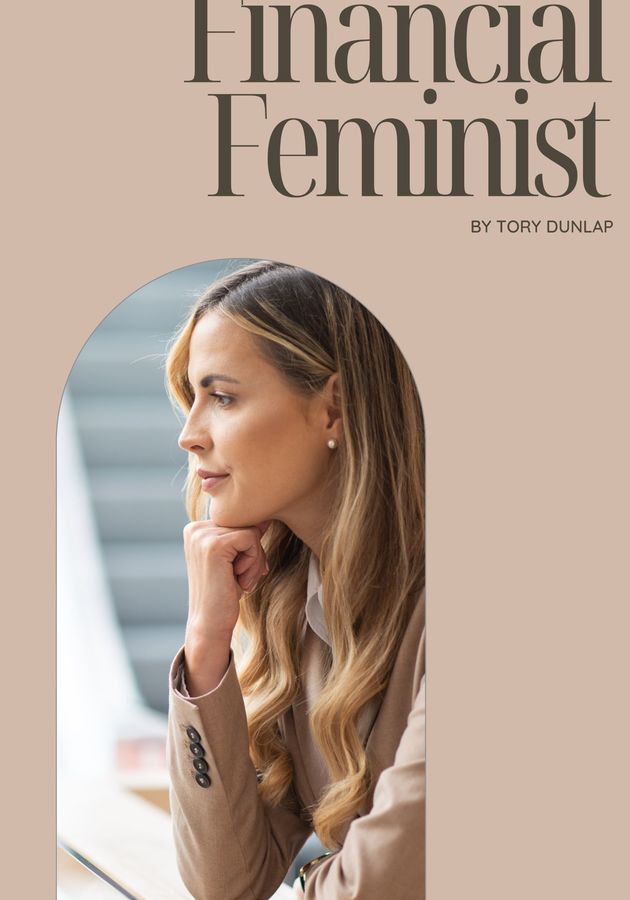Shining and dining in their ivory towers, the privileged 1% of the world—99% of them straight white males—have erected walls of exclusion, refusing to share their power and resources with those on the outside. This leaves the rest of us at a tremendous disadvantage, unable to access the same opportunities as those with privilege, unable to reach our full potential.
That’s where financial feminist guru—not to mention seven-figure business owner—Tory Dunlap comes in. She’s neither a straight white man nor just another stereotypical moneybag. In fact, her favorite quote has always been, “When you have all you need, build a longer table, not a higher fence.”
Hence, Dunlop’s famous foundation, Her First $100, the money and career platform for Gen-Z & millennial women. Hence, “Financial Feminist,” Dunlap’s nonfiction debut. It is, in Dunlap’s explanation, a book of 300 pages and 80,000 words, packing 4 long years of research that fulfilled a promise she had made to her 7-year-old self, “who had her nose buried in any book she could get her hands on.”
So, get ready to hear Dunlap’s inspiring personal story and her draft-plan to end financial oppression by empowering you, the reader, to take control of your financial life and build long-term wealth!
The benefits of saving (and being unemployed)
In late 2017, 25-year-old Tori Dunlap left her first stable job out of college (as a social media marketer) for another position. It wasn’t long before she realized this may have been the worst choice she could make. After merely a week, her new boss told Dunlap—to her face—that she was quite worried she might regret hiring her. Dunlap cried herself to sleep for the next ten weeks of her life, constantly feeling scared and small, as well as overwhelmed with anxiety and fear of being terminated.
Fortunately for Dunlap, her parents had given her a great financial education, and she had learned about the benefits of being a saver almost as soon as the first penny clinked in her improvised “Altoids tin” piggybank. Having diligently saved a sizable portion of her paycheck for an emergency fund for the past two years, one chilly January morning, she decided to check her balance. It said $100,000, give or take a few hundred bucks. This changed everything.
Realizing that a toxic job was just an emergency as an unexpected medical bill might be, Dunlap immediately quit her job, feeling empowered and, for the first time ever, in full control of her life. “How many women have to put up with being unhappy and unfulfilled in their jobs because they don't have financial security?” she thought to herself. Not long after, another thing clinked, this time in Dunlap’s head: an idea.
Almost immediately, Dunlap started a blog and a social media account, using her knowledge and experience to provide advice and resources to women who wanted to take charge of their finances. Her mission quickly gained traction, and she became a prominent voice in the personal finance space. So, she founded Her First $100K, an online community that empowers women to take control of their finances and reach their financial goals. The rest, as they say, is history—or, rather, the future.
Before we proceed any further: a few words on financial feminism
Financial feminism is a movement that aims to empower women by promoting financial education, literacy, and independence. The movement acknowledges the systemic gender-based financial discrimination that women face—such as the gender pay gap, lack of access to financial resources, and limited opportunities to invest and save—but it primarily aims to provide individual women with the tools and knowledge to take control of their finances, build wealth, and achieve financial independence.
Put otherwise, financial feminism advocates for a war on two fronts, the common goal of which is a grounds-up remodeling of our society. The movement, in the words of Dunlap, “doesn’t hand-wave away the structural problems in pursuit of individual women’s success,” but it doesn’t strive to solve all inequality problems overnight either. Hence, “Financial Feminist” is not a political pamphlet to end capitalism or start a gender revolution; just as well, “it’s not ‘I did it, so you can do it too!’ inspiration porn or a pedestal for hustle culture. Rather, it’s a survival guide.”
To reiterate, financial feminism acknowledges the cultural and societal obstacles that hinder women from attaining financial parity; at the same time, however, it remains grounded in the reality that practical challenges must be addressed daily. So, whilst advocating for policies that promote equal pay, the movement champions business education too, continually providing women access to all kinds of financial resources. Dunlap sums it up best when she says, “While we work to change the system that currently exists, we must navigate it to the best of our ability: we still have to pay our rent, buy groceries, and take care of ourselves.”
Money is psychological: emotions and narratives
The first step toward financial independence is understanding that money is psychological. Just like in the case of everything else, we attach positive or negative emotions to money too. If you see your ex on the street, a few months after an acrimonious separation, would you say “hello” to them, and smile your eyes out? Of course not. So, why should money be any different? If you’ve had a negative “first money memory,” chances are it could detrimentally affect your relationship with money as an adult, making you feel ashamed at earning a lot, or asking what is rightfully yours.
This is where the concept of "money mindset" comes in. Dunlap emphasizes the importance of understanding one's money mindset and how it can affect financial decisions and behaviors. By recognizing and addressing negative money beliefs and emotions, individuals can work towards improving their financial wellbeing and achieving financial independence. Only after unpacking “our money memories, our inherent biases, and the narratives we’ve been believing,” suggests Dunlap, can we do away with the financial self-shaming we’ve been raised with, and start changing our relationship with money.
For women, it’s twice as hard because (as James Brown used to sing), it's a man’s man’s man’s world. Hence, in addition to their negative childhood money memories, women have to also outgrow (and bust open) the Five Patriarchal Money Narratives, which can be summed up in the following five statements: 1) women don’t need financial education; 2) women talking about money are impolite; 3) if a woman wants to get rich, she must work hard; 4) women who want money are selfish and unladylike; and 5) women who want money are evil because money can’t buy one happiness, but diamonds.
From mindful spending to easy budgeting
The Five Patriarchal Narratives have been ingrained surreptitiously into many women's psyches since childhood, so it can take a lot of work to break out of these limiting mindsets. To begin with, women need to examine their current beliefs and start to replace them with ones that empower them to make financial decisions that are right for them. They should also surround themselves with positive role models who have achieved success with their finances and be sure to acknowledge their own successes and celebrate their wins. Additionally, women should take the time to learn about money and understand the fundamentals of budgeting, investing, and financial planning.
Speaking of, the first two lessons of getting to that coveted $100K are spending less money than you earn, and establishing an emergency fund. Now, don’t get Dunlap wrong: she doesn’t think that spending money is a bad thing. In fact, she gets quite infuriated that two out of three financial articles label women as “excessive spenders”—especially since women are casual victims of something called “the pink tax,” that is, paying more than men for the same products and services. Be that as it may, it’s important to spend money mindfully, which has nothing to do with not spending it at all.
Marie Kondo earned herself the title “tidying guru” by telling people to throw away everything they own that doesn’t spark joy in their hearts. Dunlap suggests the same: rather than advising you to clip coupons and check Groupon every two hours or so, she instructs you to just stop spending money on things you don’t care about. If you need help to achieve this, try grouping your expenses into three categories, using Dunlap’s 3 Bucket Budget system. Here’s how it works.
Bucket #1 is reserved for your necessary expenses, i.e., "everything you need to eat, sleep, breathe, move, and live.” Set aside 50% of your paycheck for that. Bucket #2 is all about your financial goals, be they paying off your debt or founding your own company. Put 20% of your salary, each month, in Bucket #2. Finally, the remaining 30% of your paycheck goes to Bucket #3, aptly titled “Treat Yourself.” If you earn $3,000 a month, that’s $1,500 in Bucket #1, $600 in Bucket #2, and $900 in Bucket #3. By following this system, you can make sure that your money is spent on the things you value most.
The financial game plan: investing and earning
Most women feel that saving money is enough, so they rarely invest it in anything. This, in Dunlap’s dictionary, is investing misconception #1. Investing is much more than just putting money away: it’s also making smart decisions about how to grow your money. Think of it this way: a penny that cumulatively doubles every year would equal to more than $5 million in 30 years. Could you afford to wait? Of course not! Start investing today.
As you might already know, investing can be made in stocks, bonds, mutual funds, real estate, or any other asset that has the potential to appreciate over time. Dunlap’s 5-step plan to investing properly looks like this. First, determine a retirement goal. Second, decide if you want to invest independently, use a robo-advisor, or take advantage of Treasury's services; once you do, open a 401(k) through your employer or an IRA. Third, deposit funds into the account, even if you have as little as $100. Fourth, choose what you’ll invest in—if you have no idea, index funds are the best option. Finally, repeat steps three and four regularly.
Of course, to have money to invest or save, you must first earn it. “Every piece of the financial game plan starts with you earning money,” writes Dunlap. “You can’t begin to build your savings, pay off debt, or invest unless you’re making money.” So, find a job that pays well and has good benefits. Even better, negotiate your way into one! Down with self-shame, up with fair pay. Knowing how to negotiate raises, salaries, and even job offers, can help you get the career you really want. The key, according to Dunlap, is to identify your value and take a stand for yourself. So, do it. You’re worth it!
Final notes
Dubbed “the voice of financial confidence for women” by CNBC, Tori Dunlap is perceptibly passionate about helping women become more financially secure, and this passion radiates vividly from every page—nay, sentence—of her debut book.
A culmination of four years of research, “Financial Feminist” is written in a clear and accessible yet elated and laid-back style, while being packed with quite a few practical tools, a bunch of advice, and many resources designed to help women of all backgrounds and circumstances take control of their finances and build wealth.
In the words of Justin Baldoni, “This should be required reading in high school and college! This book has an answer to every question a beginner has ever wondered about money, and how to use it to make a better life and world.”
Allow us to add this too: it is even more required reading for young women.
12min tip
Negotiate your salary. Research the industry standard and make sure you are paid fairly. Don't be afraid to ask for more money or benefits. Remember, your employer is not your friend, they are a business, so it's important to advocate for yourself and your worth.





























